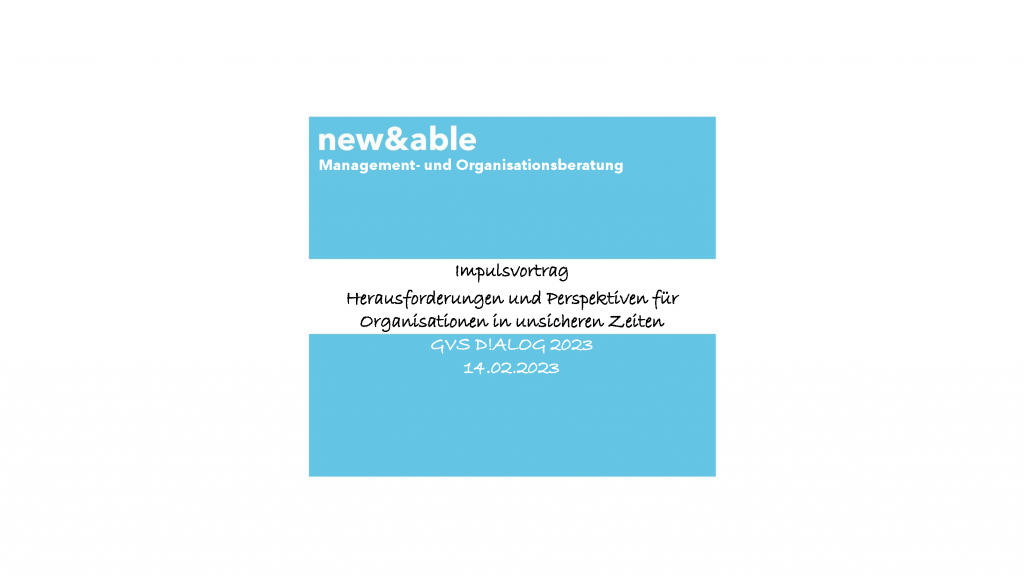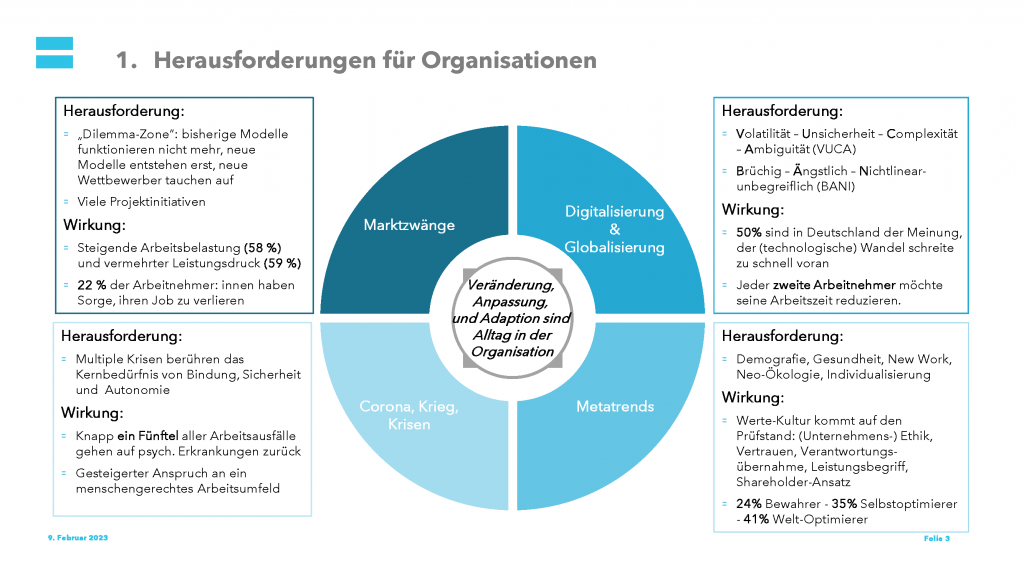Lecture GVS D!ALOG 2023
Challenges and perspectives for organizations in uncertain times
As part of the GVS-D!ALOGS 2023, Robert Dörzbach gave a keynote speech on February 14 on the topic of “Challenges and perspectives for organizations in uncertain times”.
In his presentation, he addressed the current challenges facing companies. Companies are in the so-called “dilemma zone”. Previous models no longer work, new models are only just emerging. Companies must find their way in a new, complex environment in order to remain competitive and profitable. Multiple crises such as pandemics and wars are increasing the demand for a humane working environment. They touch on the core need for attachment, security and autonomy. Almost a fifth of all absences from work are due to mental illness. Corporate ethics and culture will become increasingly important and will be a key driving force for adapting to the challenges of everyday life.
In his lecture, Robert Dörzbach presents four theses on how we can master these challenges and shape the future of our working world.
- The question of meaning becomes central
- Remote work makes the office attractive
- Future viability through resilience instead of efficiency
- More innovative through effectuation instead of causality
Meaning and purpose for your employees and stakeholders
On the path to a more purpose-driven and values-based society, organizations that prioritize creating meaning and purpose for their employees and stakeholders will be more successful. Young employees in particular are increasingly yearning for meaningful work and a goal-oriented career. By creating meaning and purpose in the workplace, companies can attract and retain top talent. Engagement and productivity also increase when employees feel that their work is meaningful and aligned with their values. Companies that not only give their employees personal responsibility, but also allow them regeneration, freedom and, above all, reflection in a team, will be more innovative in the long term. This can lead to better business results and a more positive workplace culture.
Remote work makes the office attractive
But it is not only the sense of purpose in the workplace that has advantages, but also the possibility of working remotely for 63% of employees, the office is no longer their preferred workplace, and only 12% are willing to commute to work every day. At the same time, the number of “unhappy hybrid workers” who are overworked and miss real social contact is increasing. Remote work allows employees to work from anywhere, which means greater flexibility in terms of where and when they work. But it also means that the office can become a more attractive place to work, offering a change of scenery and a more structured work environment when needed.
Employee support
The demands of the new world of work are leading to dissonance and exhaustion in many people. Employees expect support in dealing with new forms of work and greater consideration of their needs. Managers will have to focus more on the adaptability of employees and should also make use of additional support through so-called employee assistance programs. By providing stimulating tasks that match the abilities of employees, with clearly defined goals and immediate feedback, as well as by giving them conscious breaks and creative time, employee absenteeism and sick leave can be reduced.
More innovative through effectuation instead of causality
Ultimately, companies must be agile and adaptable to succeed in today’s fast-paced and challenging world. This means moving from the causality approach to the effectuation approach. The effectuation approach focuses on leveraging existing resources and partnerships to create new opportunities. It is a way of thinking and acting that prioritizes action, experimentation and collaboration over prediction and control. Ultimately, companies that embrace the effectuation principles can build a culture of innovation and resilience, positioning themselves for long-term success in a rapidly changing business landscape.







